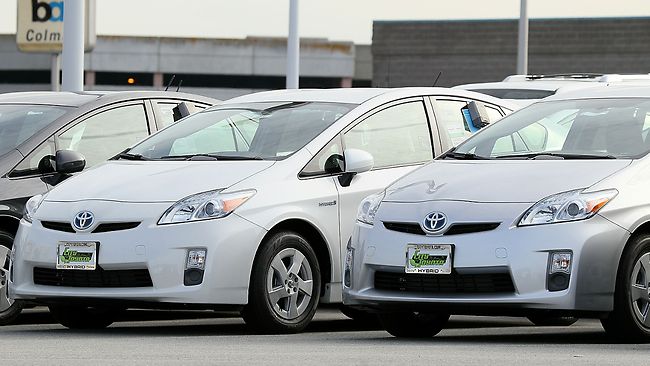Toyota on Wednesday announced a global recall of 1.9 million of its signature Prius hybrid cars, dealing a blow to a brand favoured by the eco-conscious including Hollywood celebrities.
The company said it decided on the call-back -- its biggest-ever for the vehicle -- after the discovery of problems with software used to control a power converter that posed a risk to drivers.
"Because, in the worst case, the car could stop while driving we do consider this a potential safety issue and that's the reason why we are implementing this recall," a Tokyo-based company spokesman said.
No accidents have been reported as a result of the defect, the world's biggest automaker said.
The Prius was one of the first hybrid cars to go mainstream and was quickly adopted as a symbol of green, with the likes of Leonardo DiCaprio and Cameron Diaz snapped behind the wheel.
The company recalled Prius models last year and in 2010 for different problems, but Wednesday's announcement marked the biggest call-back for a car that Toyota has bet will lead a bigger move to green cars
Last year Toyota's chairman Takeshi Uchiyamada challenged automakers to step up sales of hybrids in the United States, calling them "a long bridge" into future vehicles.
He was chief engineer of the Toyota team that developed the Prius, the world's first mass-produced gasoline-electric hybrid car, and launched it in 1997.
Since then, the company has sold over 3.6 million Prius globally.
On Wednesday Toyota said that, in most cases, the defect could set off a vehicle's warning lights and "probably" cause it to enter "failsafe mode", in which the car can still be driven but with reduced power.
"It would slow down, eventually to stop," a spokeswoman added.
Toyota said it was aware of more than 400 cases of the problem, including 300 in Japan and 90 in North America.
The recall covers about 997,000 vehicles in Japan with another 713,000 vehicles in North America. Most of the remainder are in Europe, the Middle East, and China.
The problem is the latest for Toyota and other Japanese automakers that have recalled millions of vehicles in recent years, damaging their long-held reputation for quality and safety.
In October Toyota recalled 885,000 vehicles worldwide to fix a problem with air conditioning equipment that could cause a leak that could affect air bags.
Earlier that month a US court found Toyota was not to blame for a fatal crash involving claims of unintended acceleration.
The safety scare prompted a worldwide recall of millions of cars, the first of a series for Toyota, which had previously traded on the safety and reliability of its cars.
But weeks later, the automaker lost a related court case in which it was found at fault for a fatal accident.
Toyota earlier agreed to pay about $1.1 billion to settle a class action lawsuit launched by US vehicle owners affected by the series of mass recalls.
The company did not accept any blame but agreed to compensate owners of about 16.3 million vehicles who said their value had been reduced because of the recalls.
In September last year Toyota reissued a recall of 870,000 vehicles in the United States and Canada after discovering initial repairs were not performed properly.
And in April it recalled 1.73 million vehicles worldwide because of airbag problems.
Toyota conducted a leadership shake-up in March last year after its management style had come in for criticism.



















































